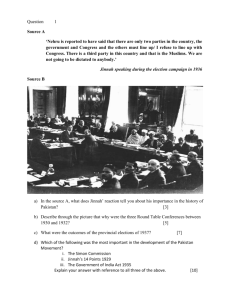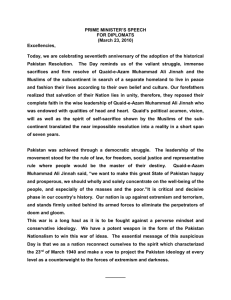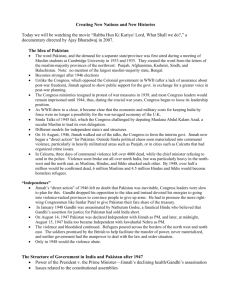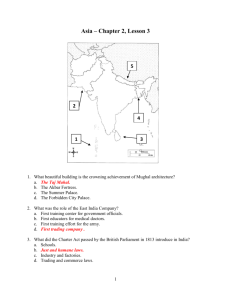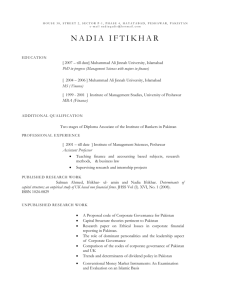Pakistan – the early years
advertisement
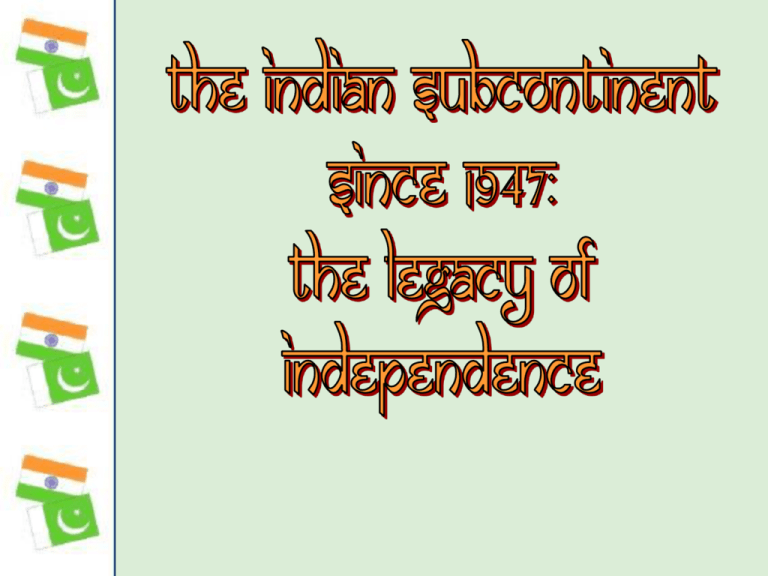
Main Ideas • Nehru was India’s Prime Minister from independence until 1964 • Jinnah was the first leader of Pakistan, but died in 1948 just a little more than a year after independence • India – Pakistan tensions since independence – border never resolved – territory of Kashmir in dispute • 2 countries became 3 – Bangladesh separated from Pakistan Main Ideas • Lack of stability – especially in Pakistan and Bangladesh – since the countries are still young • History full of assassinations and coups (short for coup d'état – overthrow of the government, usually by force with support of the military) Border problems Independent India • New Constitution gave every citizen the right to vote. • The Indian Constitution declared “Untouchability” illegal. Who might this create a problem for? Why? • Many Indians could not read or write so their government used symbols on ballots. Jawaharlal Nehru Ally of Gandhi and the first Prime Minister of India 1947-1964. Created a casteless India. Aided millions of Hindu refugees. Advocated Industrialization. Promoted “Green Revolution”. Mixed Economy. Nonalignment Movement – leader of non-aligned nations not taking sides during the Cold War. India did have disputes with Pakistan and China during his time of leadership. Non-Alignment Movement Non-Alignment Movement During the Cold War, as the countries around the world were aligning themselves with the Communist or nonCommunist nations, India became a proponent of staying neutral, or non-aligned. India’s “mixed economy” The “mix” refers to private and public ownership. India limited foreign investments for fear other countries would have to much control in India. Urban areas have high-tech companies. Three quarters of the population are farmers living in small villages. India's "Green Revolution" allowed farmers to triple their crop by using modern science and technology. India’s “Green Revolution” Introducing higheryielding varieties of seeds in 1965. Increased use of fertilizers & irrigation. GOAL make India self-sufficient in food grains. Norman Borlaug – American scientist who helped bring higher yielding crops to India Pakistan – the early years Led briefly by Muhammad Ali Jinnah (known as Quaid-i-Azam or Great Leader) until his death from tuberculosis September 11, 1948. Jinnah only told his inner circle how ill he was. Do you think a leader should reveal such an illness in this situation? Pakistan – the early years Reasons he did not reveal the illness Afraid the British would not agree to the separation of the subcontinent into India and Pakistan – indeed Lord Mountbatten, the last British Viceroy, later said he would have held off on agreeing to the creation of Pakistan until Jinnah was gone had he know how ill Jinnah was. Did not want his people to panic. Pakistan – the early years Nation struggled in early years without Jinnah. Jinnah’s second in command, Liaquat Ali Khan, assassinated three years later. Through the years, Pakistan has had a mix of elected leaders and those who seized power by using the military. Tension over the role of Islam – Islamic fundamentalism vs. more secular nation (separation of religion from government) East and West Pakistan: what do you think went wrong? Make a theory (or theories) about why this situation didn’t work out and explain. Pakistan and Bangladesh War that involved India helped East Pakistan split apart. East separated in 1972 and became Bangladesh. What was previously West Pakistan is what we know today as Pakistan. Bangladesh -political history has been filled with coups and assassinations -Awami League remains one of the major political parties -floods and famines are common -a considerably poor country throughout most of its history, with jute as its main crop -economy has been improving rapidly in the 21st century and has become more diverse India After Nehru Indira Gandhi Nehru’s daughter. Prime Minister of India, 1966-1984, with brief periods of being voted out of office. Continues Nehru’s policies. Faced corruption charges & internal rebellion. Assassinated in 1984. India’s persecution of the Sikhs Sikhs •Sikh separatists wanted to break away from the country. •Sikhs felt Hindu government did not give them a fair amount of resources. •Indira Gandhi was assassinated by Sikh bodyguards who turned on her. Rajiv Gandhi Indira’s son. Prime Minister of India, 1984-1989. Assassinated in 1991 while campaigning to get back into office. Manmohan Singh May 2004 he held up a letter from India's president authorizing him to form a new government as prime minister. He stood next to Sonia Gandhi, the candidate for the post who stunned the country when she declined the office. May 2004 Swearing in of Prime Minister Singh, the first Sikh in the job. He served for ten years. 1971 India-Pakistan War The India-Pakistan Arms Race Heats up in the late 1990s – both sides are nuclear powers Right-wing Pakistani Activists Burn Indian Flag to Protest Indian Nuclear Tests - 1998 Hot Air Balloon Protesting India & Pakistan’s nuclear testing - 1998 2002 Nuclear Statistics India Displays Nuclear Missiles During “Republic Day,” - 2002 What title would you give this political cartoon? Is this a possibility? Is the dream gone? Kashmir • State of Jammu and Kashmir, usually just referred to as Kashmir. • Area has been disputed since independence. • There was no clear decision made on which villages were on which side of the border. • One of the most violent places in the world over the last fifty years. Kashmir Crisis Indian Soldiers Near the Pakistani Border - 2001 A Pakistani Ranger At the Indian-Pakistani Joint Border Check Post in Wagha, India - 2001 Anti-war Protestors in Karachi, Pakistan - 2001 Kashmiri Militants - 2003 Major problems & Issues in Pakistan today Economic development. Political instability/military dictatorship. Hindu-Muslim tensions. Terrorism. The Kashmir dispute and nuclear weapons. Benazir Bhutto First Woman Prime Minister, 1988 Ousted in 1990, returned, then ousted again in 1993 on corruption charges. Left the country for a time, returned in 2007 with support to regain power, but was assassinated by opponents. Benazir Bhutto Famous family Father, Zulfiqar Ali Bhutto, had been prime minister earlier Husband, Asif Ali Zardari, was president for five years after her assassination Nawaz Sharif • Current Prime Minister • Serving his third term in that position • Had previously been overthrown, accused of wrongdoing, and out of the country in exile. Gen. Pervez Musharraf Coup d’etat. Secular government against Islamic fundamentalists. U.S. ally in the “War on Terror.” Partners in the “War on Terror?” Musharraf ousted • Lost support of many people for working with the U.S. in its war on terror in neighboring Afghanistan. • Resigned in 2008, living in London, planned to return for next election in 2013 but was ruled ineligible. • Recent president – Asif Ali Zardari (who was married to Benazir Bhutto). • Key leader – Prime Minister Nawaz Sharif. U.S. / Pakistan Relations Strained • 2011 – U.S. forces kill Osama bin Laden in Pakistan The Taliban • Strict Islamic fundamentalist group • Gained control of Afghanistan’s government in 1996 • Instituted Sharia (or Islamic) law • Ousted from power in Afghanistan in 2001 by US forces who attacked the country because alQaeda bases were there • Although out of power, group continued to attack US troops The Taliban • Spilled over border into Pakistan, gained control over local areas there in recent years • Pakistan’s military has fought with them – currently peace talks are planned, but they have been attempted before and not agreements have not lasted long Malala Yousafzai • Pakistani teenager who movement to raise issue of the lack of and restrictions on education for girls in her nation • Outspoken critic of Taliban • Shot in the head by a Taliban member October 2012 at age 15 • Miraculous recovery, has become international symbol for human rights and basic freedoms • Has spoken at UN, visited White House, won numerous awards and written autobiography Mumbai attacks • The 2000s were a relatively calm period in IndiaPakistan relations until the Mumbai attacks of 2008. • Twelve attacks occurred in coordination with one another, killing 257 people. • Carried out by terrorist organization believed to have ties to Pakistan’s govt. http://www.youtube.com/watch?v=1RAVcIjegj4 Liberation Tigers of Tamil Eelam (Tamil Tigers or LTTE) • Organization responsible for assassination of Rajiv Gandhi • Tamils are an ethnic group in southern India and Sri Lanka who have long felt overlooked and oppressed in both nations, especially in Sri Lanka • Also assassinated president of Sri Lanka in 1993 • Still active organization, Sri Lanka very split and unsettled


